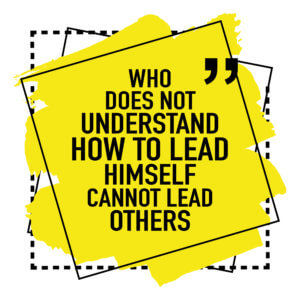
Great leadership starts with looking in your mirror and recognising that being a great leader of others, starts with being a great leader of yourself. It’s not an external journey, it’s an inside job. It’s an inner game of leadership which concludes with you being able to answer the question…why should anyone be led by YOU?
I introduced this theme last week as part of the three tracks of leadership capability; I Lead Self, I Lead the Business and I Lead Others, and this week I’m going to deep dive into why it all begins with I Lead Self.
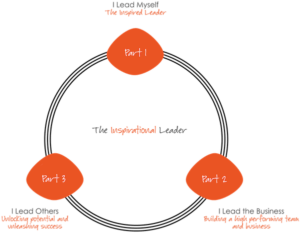
Great leadership starts with… I Lead Self
Success in life is 80% psychology and 20% strategy.
Whatever your field of endeavour, great leadership is achieved through two pathways…
Pathway #1 – Psychology & Mindset which is 80%, and Pathway #2 – Strategy & skillset, the remaining 20%.
But where do you think most individuals spend their time & energy when developing their leadership capability?
In strategy & skillset.
They’re focused on the WHAT and the HOW.
Don’t get me wrong both are fundamentally important, BUT they shouldn’t be the first things you focus on.
The first thing you should focus on is YOU.
Your psychology, your mindset.
Which brings me back to this question again… why should anyone be led by YOU, or put another way, why should anyone follow you?
Once you can answer this question, then yes, strategy & skillset come into play.
6 principles of I Lead Self
“The greater danger for most of us is not that our aim is too high and we miss it…but that it is too low and we hit it!” Michelangelo
To help you work on your inner game of leadership and become the great leader you are destined to be, I’ve broken down I Lead Self into 6 principles.
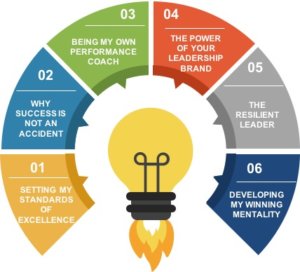
Principle #1: Setting my standards of personal excellence
What standards do you measure yourself against and hold yourself to account against?
I’m not talking here about the standards you display when people are watching. I’m talking about the standards you hold yourself accountable to all the time – because there’s always one person watching and that person is your future self.
Your future self is begging you to show some guts, to show some heart. To do that little extra now, to raise your game, so you can live with pride and all the physical and emotional trappings of success later.
Don’t let your future self-down. Identify your standards of personal excellence. The bar you set for your life, personally and professionally.
Principle #2: Why success is not an accident
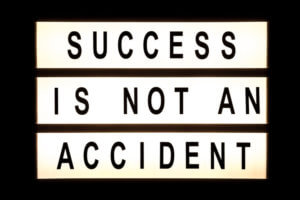
Success is not a place but a way of thinking, feeling and subsequently acting.
Consider…
What does success mean to you personally?
What does success mean to you professionally?
Are your two definitions aligned, or are they in tension?
Think about these things and you begin to raise your conscious awareness of your own motivational drivers, which in turn will help unlock your ‘Why?’ and ultimately your definition of success. When you are really clear about what success means to you, both personally and professionally, you can design your life, fully aware of the tensions and trade-offs you’re making.
What to deep dive into principle #2? Check out this blog: Why success is not an accident: 5 success secrets
Principle #3: Being my own performance coach
Each and every one of us owns our own performance through the conscious choices we make coupled with an attitude of constant curiosity for learning.

Sometimes, particularly as adults, we slip into the trap of complacency, operating in a state of unconsciousness where it feels like are just going through the motions. It’s the day you slip into a place that I call ‘the groove or the grave’ – no man’s land. It’s the day you accept your place in the world of mediocrity where just enough is good enough. It’s the day when you lose your edge and stop being your best self.
In an increasingly competitive world, there is no such thing as standing still. All around you, people are actively moving forward and standing still really means you’re falling behind.
Learn something new today should not be just a lesson from when you were a child, it should be a lifelong lesson.
Need to up your performance game? Check out: 3 important steps to improve your performance
Principle #4: The power of your leadership brand
Creating a personal brand means you are taking an active role in the direction of your life. It helps you make the most of what you’ve got to offer.
If you’re going for an interview and you were asked the question; why should I choose you? how good would you be at answering that question with confidence, clarity and purpose?
Most people realise they’ll have many jobs during their careers and must continually train to prepare for the changing workplace. As a result, creating a personal brand is not a trend; it’s a survival strategy.
You MUST:
Stand out from the crowd
Be clear what it is you stand for as a person
Know what it is you want to be known for
Understand what differentiates you from everyone else
Be clear on what makes you unique…. what gives you your edge?
Want help in developing your personal brand. Look right here; How to develop your personal brand in 5 easy steps
Principle #5: The resilient leader

What is resilience? What does resilience actually mean? One definition describes resilience as your capacity to recover quickly from difficulties, whilst another describes it as your ability to recover from or adjust easily to misfortune or change. I describe it as simply your ability to bounce back after adversity.
There are many arguments around what makes one individual more resilient than the next. In my experience building your personal resilience comes down to three things; a unique ability to confront reality head-on, an unwavering belief that life is purposeful and finally, an uncanny ability to improvise and adapt.
You’re going to take knocks, some days are going to feel like a train crash, and you will go down blind alleys. But if you have an ultimate destination in your mind’s eye, a focused goal and purpose coupled with the drive, determination and motivation then…when you do fall over, you’ll pick yourself up, dust yourself off, improvise, adapt and refocus on your goal.
Not quite sure you’ve got what it takes? Check out: What is resilience?
Principle #6: Developing my winning mentality
Your mindset, whilst incredibly powerful, does not actually care what you think; whether success or failure; a concrete, worthwhile goal or confusion, misunderstanding, fear or anxiety. It’s all the same to the human mind, which is happy to manifest either in abundance simply following your freewill and the programme you choose to run.
The rate at which you learn and progress in the world depends on how willing you are to weigh the merit of new ideas or new horizons, even if you don’t instinctively like them.
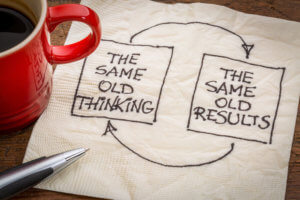
Sometimes we can get stuck in a pattern of thinking, a mindset which can be limiting, or even de-railing. Following this same pattern closes our mind to the sense of possibilities around us meaning we can miss positive and beneficial change without even realising it.
Take the challenge, and check out: Do you have an open or closed mindset?
In your pursuit of great leadership comes personal mastery
There are no crowds lining the extra mile
It’s the place where you’re on your own. Just you and the road. Just you and the challenge, or vision, or goal you’ve set yourself, professionally or personally or both!
It’s the work you do behind closed doors when no one is watching.
It’s the extra rep in the gym when everyone else has left.
It’s the extra lap around the track when it’s pouring with rain.
It’s the practice, the habits, the mindset you adopt, to make YOU the best YOU can be.
Every day, you decide how much effort you’re going to put in. A little, or what’s expected or the extra mile. I promise you, few choose the last option. It’s certainly not a crowded place. But it is often the place where the difference between good leadership and great leadership is made. It is the place of personal mastery and I Lead Self.
Are you or your people thinking I Lead Self, I Lead the Business and I Lead Others?
If not, read on…
6 skillsets you to effectively lead the business
what you need to leads others to success


